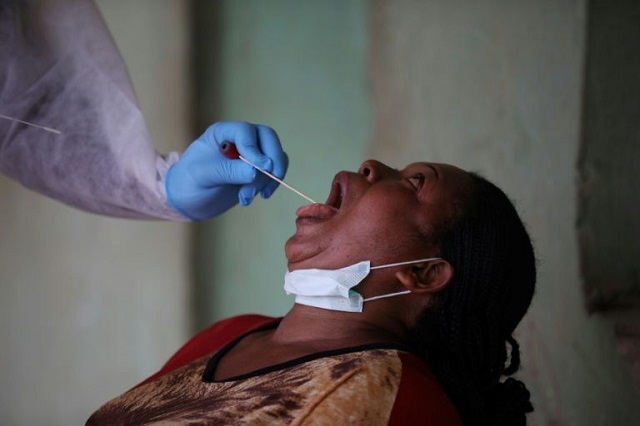
Lagos, Nigeria | AFP | A black market in coronavirus test kits is flourishing in Nigeria, spurred in part by negligible faith in the country’s health system to defeat an emerging threat.
Testing is a crucial weapon in combatting COVID-19. It not only identifies where the stealthy virus has invaded — it also helps to prevent frontline workers, in health care and the economy, from falling sick in turn.
Every country is struggling to carry out sufficient testing, but in Nigeria, Africa’s most populous country, the situation is dire.
Just 7,100 tests have officially been carried out in a population of around 200 million people.
By comparison, neighbouring Ghana, which has a population of 30 million, has carried out 68,000 tests, while South Africa, with 58 million people, has conducted nearly 114,000.
Right now, Nigeria’s 36 states have 12 official coronavirus labs, which together have a capacity to test 1,500 people per day.
“We have no idea of the status of propagation of COVID-19 in Nigeria,” a representative of a private medical lab told AFP.
The lab is awaiting government approval to purchase thousands of test kits and a machine able to carry out several hundred tests per hour.
But “demand for these tests on the black market is off the scale, off the scale,” the source said.
Lacking the equipment, the lab had to turn away a request from a foreign embassy to carry out tests for its citizens.
Nigeria’s extreme need and its dextrous entrepreneurs have unsurprisingly combined to create an instant black market.
Aware of the danger that this represents, the government has warned Nigerians against fake do-it-yourself kits that are emerging online.
– Mistrust –
The Nigeria Centre for Disease Control (NCDC) is carrying out doorstep testing in Abuja and the state of Lagos — the epicentres of the country’s 627 infections, of which 21 have been fatal.
The authorities are also putting boots on the ground, in the form of neighbourhood virus tracers, and opening brand-new quarantine centres in their show of diligence.
But they are facing a deep lack of faith in a public health system left crippled by decades of neglect.
Nearly four of every five public health facilities across Nigeria do not even have running water, Dr Francis Faduyile, president of the Nigerian Medical Association (NMA), said last month.
Thousands of Nigerian doctors work in Europe’s well-funded health services but at home, there are just 0.4 physicians per 1,000 people.
Mistrust of the public health system is such that many patients are terrified of being declared to the NCDC, a physician in a private medical clinic said.
“My patients don’t want to come to the hospital, they think we are the NCDC police who will take them to Yaba,” the source said, referring to a government-run facility for COVID-19 patients.
“They tell me on the phone, ‘If we come, you don’t send us to Yaba!!!'”
The doctor recounted that, at the start of the month, he had already seen half a dozen patients with coronavirus.
Just one of them consented to being tested, which entailed notification to the NCDC.
The authorities carried out the test, but the exercise was a waste of time. The test was eventually carried out more than two weeks after the doctor alerted the NCDC — a period longer than the virus’s incubation period.
Since then, the doctor has gone through back channels to procure around 20 test kits for his patients.
Official testing is “too slow”, said Zouera Issoufou, head of the Dangote Foundation, the philanthropic arm of Aliko Dangote, Africa’s wealthiest man.
The foundation has partnered with the government in the fight against coronavirus and ordered 250,000 test kits.
But world demand for the kits has exploded, Issoufou said. “They are arriving in dribs and drabs.”
– Stigma –
Richard Banda, a doctor with the UN’s World Health Organization (WHO) in Nigeria, said the use of dubious virus test kits was not the only problem.
Many tests are being done privately, and their results are not being shared with the authorities, he said — which means that cases may not be properly traced and isolated.
“The biggest challenge we face in the fight against COVID in Nigeria is that people are not giving accurate information in the traceability process,” he said.
“There is still an issue of stigma.”
A doctor at Lagos University Teaching Hospital told AFP that a patient had been admitted there at the end of March with coronavirus symptoms, but his relatives lied about his condition, omitting to say that he had already tested positive.
“They were afraid that we wouldn’t admit him if we knew he was positive,” the source said.
The patient eventually died — and four doctors who had been unwittingly exposed to the virus he was carrying had to be placed in quarantine.
 The Independent Uganda: You get the Truth we Pay the Price
The Independent Uganda: You get the Truth we Pay the Price



